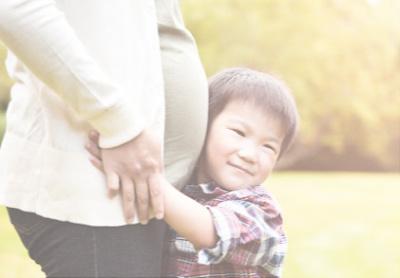With a little one at home and another baby on the way, your world is about to turn upside down. You’ll double the amount of diapers, tantrums, naps, and most of all, love. But as exciting as it is to bring a new little one into the family, your toddler at home may not be as thrilled. It’s going to be a major change in the family dynamic, and your firstborn might be overwhelmed and unsure of how this new baby will affect him.
Calm their nerves and assure them that they still loved very much–they are just about to have a new baby brother or sister to play with! Preparing your toddler for a new baby requires some patience and preparation, but with these helpful tips, he’ll be excited and prepared to step into the older sibling role.

1. Tell Your Toddler In A Way That He Will Understand
It’s important to cue your child in to what’s happening with your pregnancy, especially since he or she will start to pick up on the physical cues you are exhibiting, such as being more tired, feeling nauseated, and a growing belly. If you child is over the age of three, be sure to break the news early. We recommend having this conversation around the end of the first trimester. Tell him in a way that he’ll understand and appreciate, such as “you’re going to have a new baby brother or sister to play with.”
If the child is under three, it’s best to wait until the third trimester to share the news. Children that young don’t have a great grasp of time passing, and may not fully understand the waiting process before a baby arrives. Once your belly gets bigger, around the third trimester, he’ll start to understand that your body is changing, and that a new baby is on the way.
It’s helpful to tie the baby’s arrival into a season or holiday your toddler can understand, such as “the baby will be here by summer when we all go to the pool,” or “your little brother or sister will be here by Christmas!”
2. Be Prepared For Any Reaction

It’s hard to predict how your little one will react to having a new sibling join him in the family. Some children will be excited, while others will be angry and upset. Some will be completely confused. No matter how your child takes the news of a new sibling, be sure to reassure him that you and your partner love him unconditionally, and that will never change. If he’s indifferent, or takes a while to respond, he may just need some time to process the new information. Instead of peppering him with questions or declarations, wait until your child comes to you asking questions, and answer them as directly as possible.
3. Demystify Pregnancy By Reviewing Your Toddler’s Birth
A great way to demystify pregnancy for your toddler is to show him pictures of the time before he was born. This is also a great way to help your toddler understand what will happen over the coming months.
You can start with pictures of what you looked like before your toddler was conceived. Make it fun by asking your toddler what differences there are between those pictures and the way you look now. Ask him if mommy’s hair is different. Point out your flat tummy. Then progress through pictures where your belly has grown. Be sure to tell your toddler that was him in there. Finish with pictures of your toddler shortly after birth. Again, ask him to look for differences between what he looked like then and what he looks like now. This can help prepare him for the arrival of his sibling.
If you have videos of your toddler’s pregnancy, feel free to watch them with your toddler. Videos can be more instructive and informative than pictures. Include videos of you during your pregnancy, of you and your toddler soon after birth, and of your toddler in the first few years of life. Through those videos, your toddler can get a sense of what you went through when he was a baby. That will help him understand what will happen over the course of the coming months.
4. Include Your Child In the Pregnancy

Make sure your little one feels included throughout the pregnancy and all the baby festivities. Take your toddler with you to doctor appointments and let him hear his new brother or sister’s heartbeat. Show him ultrasound photos and let him feel the baby kick. The more involved your child is in his little sibling’s life, the more excited he’ll be to step into the role as big brother. If your child is under age three, it’s helpful to show him his own newborn photos.
Be sure to explain how much attention you’ll need to give the new baby when he or she arrives. Try “little babies are small and fragile, and mommy will need to hold him or her a lot of the time like I did with you.” This will prepare your toddler for what to expect when the new baby arrives.
5. Introduce The New Sibling Calmly After Birth
Everything surrounding giving birth is chaotic: rushing to the hospital, dealing with a room full of doctors and nurses, and a well-meaning, but impatient, family in the waiting room eager to get a glimpse of your new little guy or girl. When it’s time for your toddler to meet his new sibling, make sure it’s in a calm environment, so the focus can be on your toddler and the new baby. If your toddler is old enough, let him hold his new little sibling (with supervision, of course) and explain just how much this new baby is going to love him and look up to him.
6. Show Your Toddler The Proper Way To Interact With Your Baby
You know your newborn is fragile, but your toddler may not be. Instead of expecting him to figure it out on his own and then chastising him for being too rough, set aside time to guide your toddler through the proper way to interact with his sibling.
Show your toddler his new brother or sister’s tiny fingers and toes. With your help, let him hold the newborn and feel his or her weight. Ask your toddler how he feels when he gets his finger pinched in a toy and then tell him that his sibling can feel the same thing. This will help your toddler realize that he needs to be gentle so he doesn’t hurt his sibling.
7. Maintain A Normal Routine With The Older Sibling
While going from one child to two is going to change your daily lives and make things more chaotic, try to stick to your little one’s routine as much as possible. This will be easier if you and your partner can work as a team by setting clear responsibilities for each of you to tackle. The more your older child can stick to the same morning routine, lunch and dinner times, bathtime and bedtime, the easier it will be for him to adjust to the new brother or sister in his life.
8. Praise Him For Performing Older Sibling Duties
It’s important to recognize when your toddler is performing his sibling duties. If he’s being gentle with the new baby, kissing him on the head, or helping you pick up toys, make sure you acknowledge how responsible and loving he is towards his baby brother or sister. The positive recognition will give him a confidence boost and reinforce good behavior. If the older sibling starts acting out violently or threatening to harm the baby in any way, correct that behavior immediately. Remind him that babies are small and fragile, and that he needs to be careful around a newborn.
9. Help Them Feel Important
In addition to praising your toddler’s good big sibling behavior, assign him age-appropriate responsibilities so he feels like he’s important to the new baby’s life. Asking them to help you dress and bathe the baby, or fetch you diapers for changings will give them a sense of pride that he’s part of the process. As always, remind your older child that his parents love them more than ever, and a house with a new baby brother or sister is never going to change that. Make your child feel secure by explaining that you’re all one big, happy family.
10. Spend One-On-One Time With Your Older Child
Spending one-on-one time with your older child can be difficult with a new baby in the house. Making time for your toddler, though, can help him adjust to the new family dynamic. When your newborn is napping, take some time to play with your older child. Cuddle up on the couch and read a book or watch a video together. Ask him to show you his favorite toys. Even playing a video game together can be a fun way to rejuvenate and reinforce the bond you have with your toddler.












